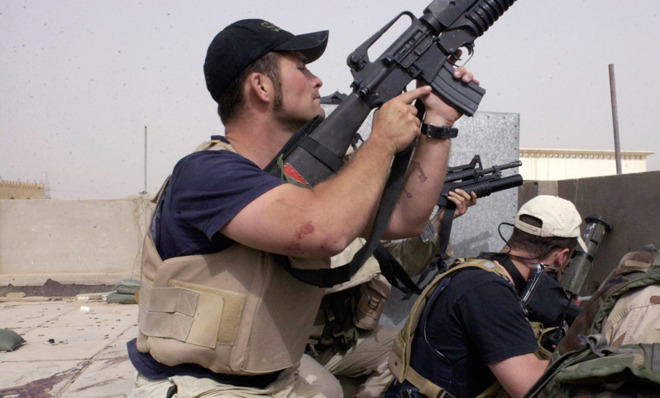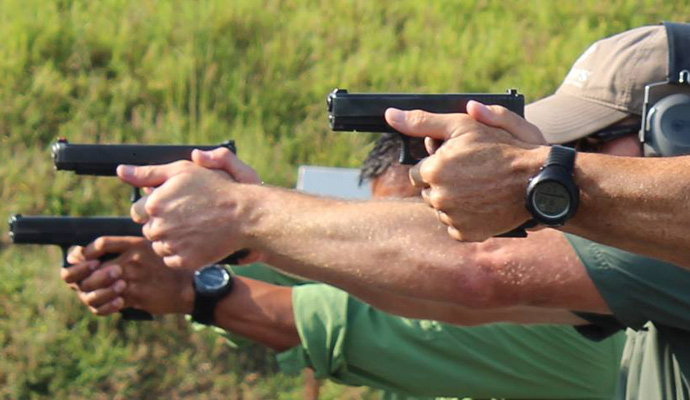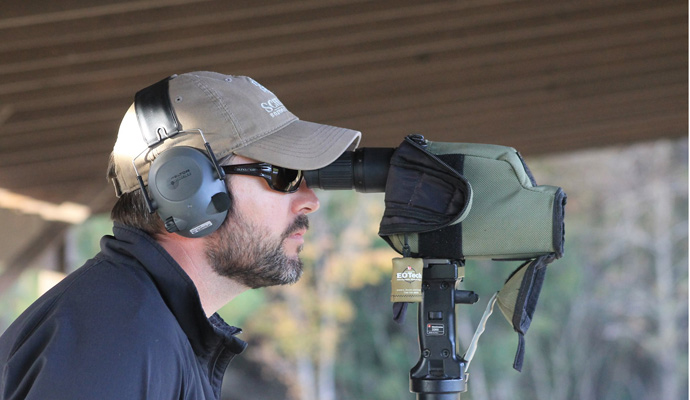America's private sector army
Inside the troubled history of the company formerly known as Blackwater

A free daily email with the biggest news stories of the day – and the best features from TheWeek.com
You are now subscribed
Your newsletter sign-up was successful

Prior to the Iraq war, most people wouldn't have heard of the private military companies (PMCs) that provide their services to the U.S. Then came the the headlines, thick and fast, as the heavy involvement of PMCs such as Blackwater led to controversy.
The number of contractors used is staggering. In 2010 there were 94,413 contractors in Afghanistan, compared with 91,600 U.S. troops.
Mercenaries in everything but name
The Week
Escape your echo chamber. Get the facts behind the news, plus analysis from multiple perspectives.

Sign up for The Week's Free Newsletters
From our morning news briefing to a weekly Good News Newsletter, get the best of The Week delivered directly to your inbox.
From our morning news briefing to a weekly Good News Newsletter, get the best of The Week delivered directly to your inbox.
Most PMCs provide logistical support, but one stands out above all others: Blackwater. Described by some as a "private army," they differ from modern day military units such as the British Army's Brigade of Gurkhas and the French Foreign Legion, in that they are an autonomous company providing military services. Mercenaries in everything but name. Blackwater in particular stands out for their boots-on-the ground provision of "security guards" who look and operate like any other combat soldier.
Blackwater, now called Academi, became known for a string of controversial incidents involving its personnel. Now that Middle Eastern occupations are winding down and court cases have been settled, Blackwater has managed to slip under the radar again. But it still exists, albeit with a new name, and is as influential as ever.
In the sixteen years of its existence, Blackwater has changed the face of modern warfare. How did they do it, what are they doing now, and what does their continued existence mean for the future?
In explaining his vision for Blackwater, its founder Erik Prince famously stated: "We are trying to do for the national security apparatus what FedEx did for the Postal Service." It's a bold, and, for many, terrifying statement. There are a few services that even those of the most ardent pro-privatization bent think should be provided by the government, the military being top of the list. While Blackwater might not have achieved its stated aim, it didn't fall far short of the target.
A free daily email with the biggest news stories of the day – and the best features from TheWeek.com
Blackwater started out by offering training services to the military and landed a major contract to train Navy personnel following the 2000 bombing of USS Cole of the coast of Yemen.
With their reputation established, Blackwater began to hoover up government contracts as the War on Terror progressed. At first they provided security to secret CIA bases, then they became the default private security force for the raft of diplomats and State Department employees who found themselves involved in occupied Iraq. Blackwater proudly reminded people that "not one State Department employee was killed while we were protecting them." No officials may have been killed but a number of innocent Iraqis did, at the barrel of Blackwater guns.

The U.S. military has long had a reputation for financial ineptitude when it come to hardware acquisition. It's a reputation that has persisted with their procurement of contract services. At the height of the Iraq War, sergeants in the military were getting paid one-sixth of their counterparts from Blackwater. This problem of capitalism colliding with patriotism was so serious that Defense Secretary Robert Gates considered asking U.S. troops to sign a non-compete clause.
The political establishment also quickly learnt that delegating to outsiders doesn't protect you from the negative PR they generate. Additionally, putting contractors into a war zone can lead to you paying for their mistakes militarily. In March 2004, four Blackwater personnel who were protecting a convoy were ambushed in Fallujah, killed, dragged through the streets, and their bodies hung from a bridge. The incident forced the US military into a major engagement: the first battle of Fallujah.
The largest incident branded on Blackwater's reputation is what has become known as The Blackwater Baghdad shootings. On September sixteenth 2007, Blackwater military contractors shot and killed seventeen Iraqi civilians in Nisour Square, Baghdad. The incident sparked an FBI investigation, the passing of a bill in The House of Representatives to make all private contractors working in combat zones subject to prosecution by US courts, and numerous legal cases. The pretense of PMCs being security guards and not military personnel was blown open, but the real impact was the generation of anti-American feeling in the region.
One Iraqi summed up the reputation of Blackwater among the local population at the time:
They became a symbol of what was seen as an occupying force. They are always heavily armed with machine-guns, and wear body armor and wraparound sunglasses. Usually they are beefy men with goatees, covered in tattoos. They swagger around like something out of a movie. Their presence here has been deeply damaging.
Going forward
Following their involvement in Iraq, Blackwater has been on a mission to clean up its image, first changing its name to "Xe Services LLC" in 2009, and then changing again to the achingly bland "Academi."
Blackwater has taken what it learned from training U.S. forces, its time providing security in Iraq and training the Iraqi Army, to grind out a place as an elite military training academy. Their 7,000 acre site in North Carolina plays host to special forces members from throughout the U.S. military spectrum, though whom they teach and what they teach them isn't disclosed.

Blackwater has become a destination of choice for ex-public servants looking for a cushy retirement, resulting in the company having even stronger ties to the centers of American power post-Iraq than pre-Iraq. The board of directors now includes Bobby Ray Inman, the former head of the National Security Agency and Jack Quinn, the former White House Counsel to President Bill Clinton.
Lessons have been learned by both the government and private companies from their flirtation over the last couple of decades and the legacy will have repercussions on future conflicts. The government has found a way to patch up their military personnel shortcomings with off-the-shelf and adaptable solutions.
Employing private contractors also has the added benefit of deflecting some negative press: The deaths of PMC members don't make it onto the death toll statistics that get wheeled out by the press every time a soldier dies.
The private sector has learned the hard way that despite being given a license to run around another country with a gun, they still have to exist in the glare of public relations. Academi's website now has pictures of children holding hands and is stuffed with buzzwords like "integrity," "excellence," and "dignity."
Most of all they've learned that money is to be made by sticking their fingers in the military pie.
By buying up experienced Army personnel, Blackwater have made themselves indispensable as a training institution for America's elite troops. And next time the U.S. goes gung-ho into another country? The contractors will be ready. Academi have developed and manufactured their own infantry mobility vehicle called The Grizzly APC. They were too late to the military hardware party this time around but they have all the pieces in place to take an even greater role in the U.S.' next major conflict.
With military budgets being slashed all over the Western world, chances are if another major conflict happens, private contractors will be critical to the war effort.
More from The Kernel...